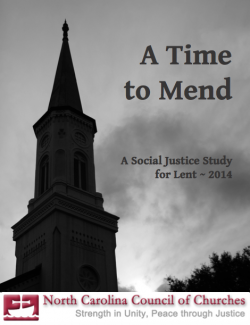 In recognition of our faithful call and of this time in history, the Council’s annual Lenten guide focuses on poverty and the ways we can respond to our sisters and brothers of low-income. We hope you and your family will find cause for reflection and inspiration for action as you share this intergenerational resource together. May we continue building as a nation toward a place where God’s love is felt by everyone through the meeting of basic human needs and the extension of true opportunities for progress.
In recognition of our faithful call and of this time in history, the Council’s annual Lenten guide focuses on poverty and the ways we can respond to our sisters and brothers of low-income. We hope you and your family will find cause for reflection and inspiration for action as you share this intergenerational resource together. May we continue building as a nation toward a place where God’s love is felt by everyone through the meeting of basic human needs and the extension of true opportunities for progress.
Click here to download “A Time to Mend: A Social Justice Study for Lent.”
Special thanks to Gene Nichol, recipient of the Council’s “Faith Active in Public Life” award, Director of the Center on Poverty, Work and Opportunity, and Boyd Tinsley Distinguished Professor at the University of North Carolina at Chapel Hill School of Law, for contributing this chapter.
Scripture: Proverbs 4:4-13 (NRSV)
“Let your heart hold fast my words; keep my commandments, and live. Get wisdom; get insight: do not forget, nor turn away from the words of my mouth. Do not forsake her, and she will keep you; love her, and she will guard you. The beginning of wisdom is this: Get wisdom, and whatever else you get, get insight. Prize her highly, and she will exalt you; she will honor you if you embrace her. She will place on your head a fair garland; she will bestow on you a beautiful crown.”
Hear, my child, and accept my words, that the years of your life may be many. I have taught you the way of wisdom; I have led you in the paths of uprightness. When you walk, your step will not be hampered; and if you run, you will not stumble. Keep hold of instruction; do not let go; guard her, for she is your life.
Social Justice Reflection
Sometimes we try to reform everything except what most needs reforming.
Recently, some of my more accomplished (and less opinionated) colleagues released an immensely distressing study. Chapel Hill and Madison medical scholars demonstrated that poverty has direct, potent and harmful impact on early brain development.
By age four, kids living in economic distress show diminished brain tissue essential to process information. Potential identifying causes included poor nutrition, sleep deprivation, lack of suitable reading materials and stimulation, parental stress and unsafe physical environments. The causal list was long and non-exhaustive. The conclusion, though, was linear and inescapable: poor kids begin to experience diminished life chances almost immediately.
Then the Public School Forum released its 2013 figures revealing that North Carolina’s 10 highest spending counties, last year, spent almost $60,000 more, per classroom, than our lowest spending ones. The unholy gap exists “because of the variation in property wealth across the state.” The richest counties have “more than 2 million in real estate capacity available per student.” Poorer counties have about $380,000 in capacity for each school kid. The gulf widens every year.
These two distinct, but linked, reports touch on a much larger, undisputed, and even more opportunity crushing reality: Students from economically disadvantaged families perform decidedly less well, on average, than their peers from more advantaged backgrounds. This, of course, is the famous zip code standard. Little matters so much to a kid’s success as the wealth of his family and neighborhood.
Proof of our stunning economic achievement gap is fulsome. Stanford’s Sean Reardon wrote last year that the link between family income and educational achievement “may be the most robust pattern demonstrated in all of education scholarship.” In other words, not only do we know wealthier kids have a giant leg up in educational opportunity, we know it more irrefutably than we know anything else about American education. Some first principle.
And the long-developed pattern is picking up speed. A new national report finds “the achievement gap between children from high and low income families is 40% larger for children born in 2001 than those born 25 years earlier.” In fact, it’s been growing for 50 years. The income gap is now “twice as large as the black-white” achievement gap. A half-century ago the numbers were reversed.
International comparisons tell an identical tale. Data from the massive Program for International Student Assessment (PISA) show that among 15 year olds, both here and in each of the 13 or so countries significantly outpacing us, students of diminished economic status have much lower test scores than their more advantaged homeland counterparts. In every single nation.
As Helen Ladd (Duke) and Edward Fiske (Fiske Guide to Colleges) put it: “Can anyone credibly believe that the mediocre performance of American students on international tests is unrelated to the fact that (almost a quarter) of our children live in poverty?”
The Stanford Economic Policy Institute, after sifting through the new PISA findings, determined that if the U.S. had an economic “composition similar to that of the leading nations,” we’d rise to 6th from 14th in reading, and to 13th, from 25th, in math.”
In other words, we do worse than our international competitors because we allow about twice as many of our kids to live in wrenching poverty. We’re the richest, to be sure. But we’re also content to lead the advanced world in child poverty – rejecting the clear command of Mathew 25:40. This, of course, creates unspeakable hardship for millions of innocent kids. It also makes it demonstrably impossible to have one of the world’s leading education systems.
The troubling correlation between education and poverty places North Carolina reform efforts in odd posture. For many state leaders, the drive to “reform” our education system – through vouchers, charters, endless tests, performance measures, and the like – is paired with policies which ignore and, in operation, actually increase child poverty. We’ll use every reform tool in the arsenal except the one that the entire world knows matters most – lifting kids from debilitating hardship. As if a child can learn effectively when she is hungry, sick, ill-clad, unsupported, unchallenged and unprepared.
The marriage of poverty and educational underperformance should also give pause to the many Tar Heels who claim, I can attest, that the only anti-poverty program they support is education. It’s a consoling thought, perhaps. But it is literally, quite literally, impossible to secure equal educational opportunity while 26% of our children, 41% of our children of color, live in torturous poverty.
It’s like trying to grow an oak tree in the Arctic. Can’t be done.
Closing Prayer
God, who loves all children, values all children, provides for all children, help us as your servants to knock down barriers that would deny all those children opportunity, success, and equality. Amen.
Links
- www.childrensdefense.org
- www.nccp.org
- www.aecf.org
- www.law.unc.edu/centers/poverty
Intergenerational Questions
Explain that many children do not have the same support system for doing well in school. Explain that it is difficult to learn if you are sick, hungry, etc.
Explain that poor families have lots more challenges than other families. Read Matthew 7:12. Discuss ways your child can respond with kindness to those classmates. This is an opportunity to introduce anti-bullying principles that will encourage your children to befriend a classmate who needs support. Pray with your children, asking for courage to treat others with kindness and love.
Over dinner or during family devotions ask your children some of these discussion starter questions:
What kinds of things would make it hard for you to pay attention in school? (being hungry, not getting enough sleep, feeling sick, feeling that your parent don’t care, not knowing where you will sleep that night, etc.)
Do you have classmates that seem to struggle to do well in school? What makes them different? (free lunch, their clothes, their attention level, their behavior)
What contributions does your family provide that make it easier for you in school? (nice home, breakfast, transportation, help with homework, etc.)
How does it feel when you are not prepared for class?
Intergenerational Activities
- Find an early childhood nutrition program in your area. Contact them about what you can donate to supplement their program.
- Collect school supplies that can be donated to your child’s classroom so that each child will have what they need to learn.
- If your child participates in a program like Scouts or sports team, contact the leaders and coaches about being a sponsor for a child who cannot participate due to lack of funds or support.
- Volunteer for after-school tutoring. Some schools have peer-to-peer tutoring and you can encourage your kids to participate.
- Donate your child’s books that they no longer need to their classroom or a reading program, such as
- www.readandfeed.org.
- Provide financial support for a class field trip so that a child who could not otherwise afford it can participate.
- Volunteer at your child’s school. Teachers need your help. Find creative ways to be supportive of every child in the classroom.

